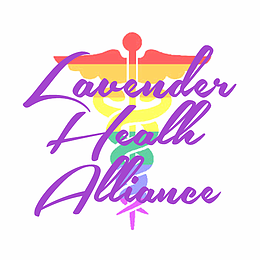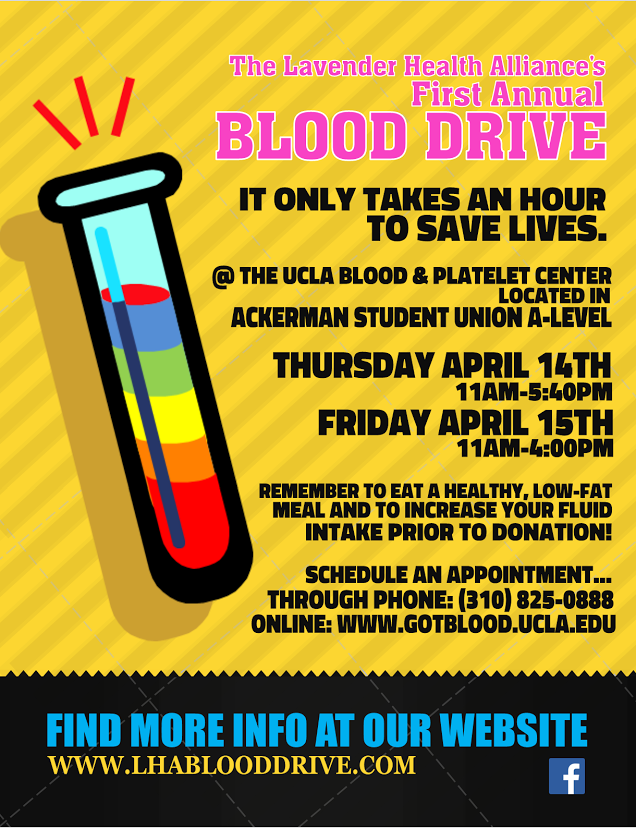by Guest Contributor Austin Beltrand
The Event:
The Lavender Health Alliance will be hosting a Blood Drive at the UCLA Blood and Platelet Center during Thursday and Friday of 3rd week as part of USAC’s LGBTQ Awareness Week. The donation center is on the A-level of Ackerman Student Union, and will be open between 11am and 4pm on the days of the drive.
The Cause:
In 1983, the FDA began enforcing a life-time deferral of men who reported sex of any form with other men (including fellatio) due to elevated rates of HIV/AIDs infection among this demographic. However, the FDA only deferred women from donating blood for only 12 months following sexual contact with ineligible MSMs. We believe that this discrepancy was clearly unjustified and therefore discriminatory. The FDA recently changed its MSM policy to 1-year deferral in lieu of the lowering prevalence of HIV/AIDs among MSMs and the development of routine, accurate testing for HIV/AIDs in the blood supply. This progress falls short of the LHA’s expectations. In short, our petition argues that the FDA’s 1-year deferral of MSMs* unduly restricts the already limited blood supply, and wrongly excludes MSMs who are at a low-risk of having HIV/AIDs .
Our proposed alternative is to identify these low-risk MSMs through expanding the screening process. These low-risk MSMs have the right to join the community in saving lives. Please see our website if you’d like a more in depth history of MSM deferral in the United States . The LHA would like to stress that MSM deferral isn’t just an issue for the gay community, since the FDA wrongly defines a a man by sex rather than by gender, and many transgender women are ineligible to donate as a result. The policy excludes on the basis of sexual practice, not identity. The community as hole feels the affects of this law, a fossil of the past which we direly need to change.
What can you do to offer your support?
All persons are welcome to sign the petition, which only takes 1 minute. The linked form provides an opportunity for those singing to identify themselves in relation to UCLA or as a representative of a organization. We also encourage individual organizations to endorse our campaign through a letter of support. All materials will be mailed to our two CA senators as well as the FDA itself. This page of our our website lists additional ways to get involved. You can also join our FB group for the petition, invite your friends, or share the event on your wall. The most effective way of helping-out is to invite friends one-on-one.
We encourage those made newly eligible by the 1-year deferral of MSMs (i.e. men who have sex with men) to donate. Please remember to sign-up for the days of drive (4/14 & 4/15). Also, get a healthy, low-fat meal and drink plenty of fluids before donating. The eligibility requirements for donating are linked here. Those ineligible to donate can still help by following the directions at the bottom of our website: www.lhablooddrive.com. You can also register online or by calling 310.825.0888 ext. 2. If you have any questions, then please feel free ask them on our FB group. Please remember that donating saves lives! The slogan is old, so people oftentimes forget the significance of its truth.
We will have volunteers from the LHA and possibly other clubs stationed on Bruin Walk and outside the Blood and Platelet Center before the days of the drive. You can register to donate or sign the petition with these volunteers. They’ll also be taking pictures of our supporters for a Facebook photo campaign. I hope on expanding the drive or petition to other colleges in future years, as well as doubling-down on our political efforts–for example, through phoning the FDA directly, or adding to our platform fair compensation policies for UCLA faculty and staff blood donations.
About the author:
The administrator of the blood drive is the LHA’s IVP, Austin Beltrand. The National Red Cross awarded Austin with scholarship for organizing 2 successful blood drives in high school. Austin became inspired to start the petition to end MSM discrimination because the law excludes him as well. He wanted to follow the lead of other similar drives already throughout the country. The most important motivator in creating the drive were blood shortages. Austin has friends who medical needs require constant transfusions, so these shortages interfere with their health and well-being.



